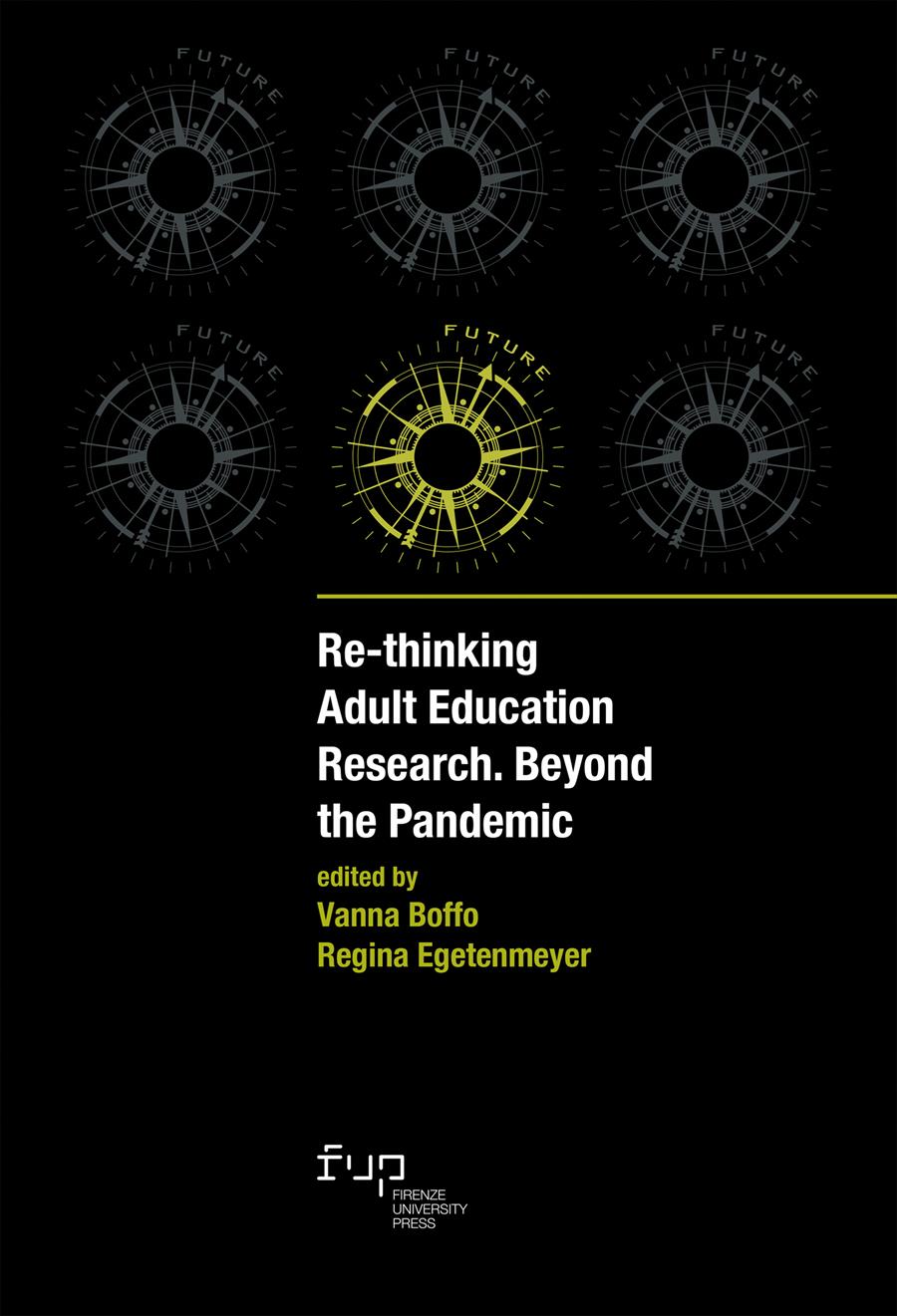- Re-thinking Adult Education Research. Beyond the Pandemic
- Edited by Vanna Boffo, Regina Egetenmeyer
The Digital Transformation of Higher Education: From INTALL Project Results to Practical Implications for the New Normal
- Concetta Tino
- © 2023 Author(s) |
- CC BY 4.0
- DOI: 10.36253/979-12-215-0151-3.24
The Covid-19 pandemic has shaped every area of our lives in few months, and the consequent effects at personal, professional and organisational level are unprecedented. Specifically, as a consequence of this forced change, Higher Education systems have registered the necessity to transform learning and teaching processes to provide responses to new learners’ needs. The aim of the paper is to present the output of a comparative group discussion of Intall project, and to show how it supports reflection on some practical implication for the New Normal. Reflecting on the output obtained through a comparative group discussion on ‘Re-thinking teaching and learning during the pandemic Covid-19’, the paper wants to present the main issues that the education systems have been facing during the pandemic, and to provide insight into the practical implications for the New Normal in higher and adult education. This paper provides some contributions to the debate on teaching and learning in higher education for the New Normal.
- Keywords:
- Covid-19,
- Higher/Adult Education,
- Learning,
- New Normal,
- Teaching,
University of Padua, Italy - ORCID: 0000-0002-5397-9473
- Coman, Claudiu, Țîru, Laurentiu G., Meseșan-Schmitz, Luiza, Stanciu, Carmen, and Maria C. Bularca. 2020. “Online Teaching and Learning in Higher Education during the Coronavirus Pandemic: Students’ Perspective.” Sustainability 12 (24): 10367. DOI: 10.3390/su122410367
- Dubey, Pushkar, and Deepark, Pandey. 2020. “Distance Learning in Higher Education during Pandemic: Challenges and Opportunities.” International Journal of Indian Psychology 8 (2): 43-46. DOI: 10.25215/0802.204
- EdSource. 2020. Coronavirus: Highlighting Strategies for Student Success. <https://edsource.org/topic/coronavirus> (2023-03-15).
- Egetenmeyer, Regina. 2017. “Comparative Studies in Adult Education and Lifelong Learning: The Joint-Module Methodology and its Context.” In Joint Modules and Internationalisation in Higher Education: Reflections on the Joint Module Comparative Studies in Adult Education and Lifelong Learning, edited by Regina Egetenmeyer, Paula Guimarães, and Balázs Németh, 127-41. Frankfurt an Main: Peter Lang.
- Gallie, K., and Darren M., Joubert. 2004. “Paradigm Shift: From Traditional to Online Education.” Studies in Learning, Evaluation and Development SLEID 1 (1): 32-36.
- Irfan, Muhammad, Kusumaningrum, Betty, Yulia, Yuyun, and Sri A. Widodo. 2020. “Challenges during the Pandemic: Use of E-learning in Mathematics Learning in Higher Education.” Infinity Journal 9 (2): 147-58. DOI: 10.22460/infinity.v9i2.p147-158
- Jena, Pravat K. 2020. “Impact of Covid-19 on Higher Education in India.” International Journal of Advanced Education and Research (IJAER) 5 (3): 77-81. DOI: 10.31235/osf.io/jg8fr
- Koehler, Matthew J., and Punya, Mishra. 2008. “Introducing TPCK.” In Handbook of Technological Pedagogical Content Knowledge (TPCK) for Educators, edited by AACTE Committee on Innovation and Technology, 3-29. New York: Routledge.
- Koehler, Matthew J., and Punya Mishra. 2009. “What Is Technological Pedagogical Content Knowledge (TPACK)?” Contemporary Issues in Technology and Teacher Education 9 (1): 60-70.
- Koehler, Matthew J., Mishra, Punya, and William Cain. 2013. “What is Technological Pedagogical Content Knowledge (TPACK)?” The Journal of Education 193 (3): 13-19.
- Lederman, Doug. 2020. “Will Shift to Remote Teaching Be Boon or Bane for Online Learning?” Inside Higher Ed. 18 March 2020. <https://www.insidehighered.com/digital-learning/article/2020/03/18/most-teaching-going-remote-will-help-or-hurt-online-learning> (2023-03-15).
- Mishra, Lokanath, Gupta, Tushar, and Abha Shree. 2020. “Online Teaching-Learning in Higher Education during Lockdown Period of COVID-19 Pandemic.” International Journal of Educational Research Open 1: 100012. DOI: 10.1016/j.ijedro.2020.100012
- Mseleku, Zathembe. 2020. “A Literature Review of E-learning and E-teaching in the Era of Covid-19 Pandemic.” International Journal of Innovative Science and Research Technology 5 (10): 588-97.
- Nakamura, Yasuyuki, Yoshitomi, Kentaro, Kawazoe, Mitsuru, Fukui, Tetsuo, Shirai, Shizuka, Nakahara Takahiro, Kato Katsuya, and Tetsuya Taniguchi. 2018. “Effective Use of Math E-learning with Questions Specification.” In Distance Learning, E-Learning and Blended Learning in Mathematics Education. Interantional Trends in Research and Development, edited by Jason Silverman, and Veronica Hoyos, 133-48. New York: Springer.
- OECD. 2020. Education Responses to COVID-19: Embracing Digital Learning and Online Collaboration. <http://www.oecd.org/coronavirus/policy-responses/education-responses-to-covid-19-embracing-digital-learning-and-online-collaboration-d75eb0e8/> (2023-03-15).
- Özyurt, Özcan, Özyurt, Hacer, Baki, Adnan, and Bülent Güven. 2013. “Integration into Mathematics Classrooms of an Adaptive and Intelligent Individualized E-learning Environment: Implementation and Evaluation of UZWEBMAT.” Computers in Human Behavior 29 (3): 726-38.
- Paudel, Pitambar. 2021. “Online Education: Benefits, Challenges and Strategies During and After COVID-19 in Higher Education.” International Journal on Studies in Education 3 (2): 70-85. DOI: 10.46328/ijonse.32
- Pokhrel, Sumitra, and Roshan Chhetri. 2021. “A Literature Review on Impact of COVID-19 Pandemic on Teaching and Learning.” Higher Education for the Future 8 (1): 133-41. DOI: 10.1177/2347631120983481
- Schön, Donald A. 1983. The Reflective Practitioner: How Professionals Think in Action. New York: Basic Books.
- UNESCO. 2017. A Guide for Ensuring Inclusion and Equity in Education. Paris: UNESCO. <https://unesdoc.unesco.org/ark:/48223/pf0000248254> (2023-03-15).
- Williamson, Ben, Eynon, Rebecca, and John Potter. 2020. “Pandemic Politics, Pedagogies and Practices: Digital Technologies and Distance Education During the Coronavirus Emergency.” Learning, Media and Technology 45 (2): 107-14. DOI: 10.1080/17439884.2020.1761641
- Yusuf, Nadia and Nisreen Al-Banawi. 2013. “The Impact of Changing Technology: The Case of E-Learning.” Contemporary Issues in Education Research 6: 173-80. DOI: 10.19030/cier.v6i2.7726
- Zaharah, Zaharah, Kirilova Galia I., and Anissa Windarti. 2020. “Impact of Corona Virus Outbreak Towards Teaching and Learning Activities in Indonesia.” SALAM: Jurnal Sosial Dan Budaya Syar-I 7 (3): 269-82. DOI: 10.15408/sjsbs.v7i3.15104
Chapter Information
Chapter Title
The Digital Transformation of Higher Education: From INTALL Project Results to Practical Implications for the New Normal
Authors
Concetta Tino
Language
English
DOI
10.36253/979-12-215-0151-3.24
Peer Reviewed
Publication Year
2023
Copyright Information
© 2023 Author(s)
Content License
Metadata License
Bibliographic Information
Book Title
Re-thinking Adult Education Research. Beyond the Pandemic
Editors
Vanna Boffo, Regina Egetenmeyer
Peer Reviewed
Number of Pages
284
Publication Year
2023
Copyright Information
© 2023 Author(s)
Content License
Metadata License
Publisher Name
Firenze University Press
DOI
10.36253/979-12-215-0151-3
ISBN Print
979-12-215-0150-6
eISBN (pdf)
979-12-215-0151-3
eISBN (xml)
979-12-215-0152-0
Series Title
Studies on Adult Learning and Education
Series ISSN
2704-596X
Series E-ISSN
2704-5781
